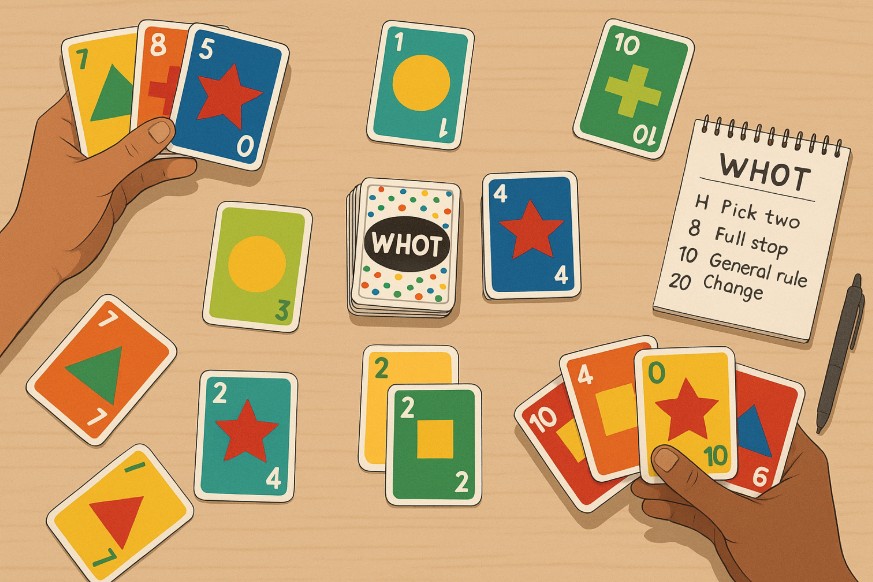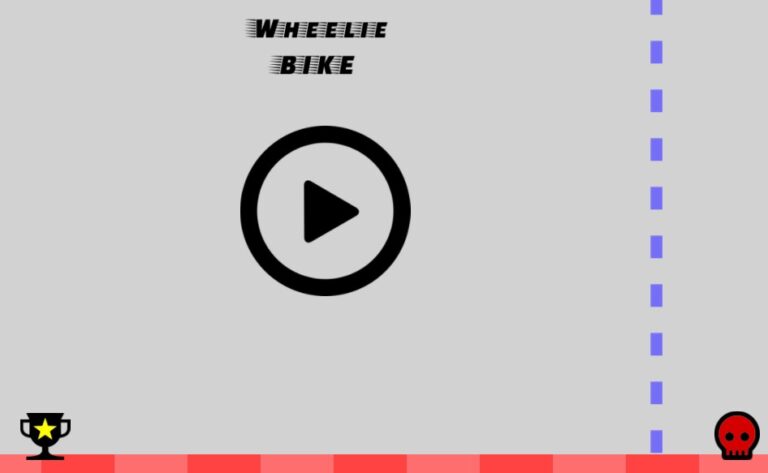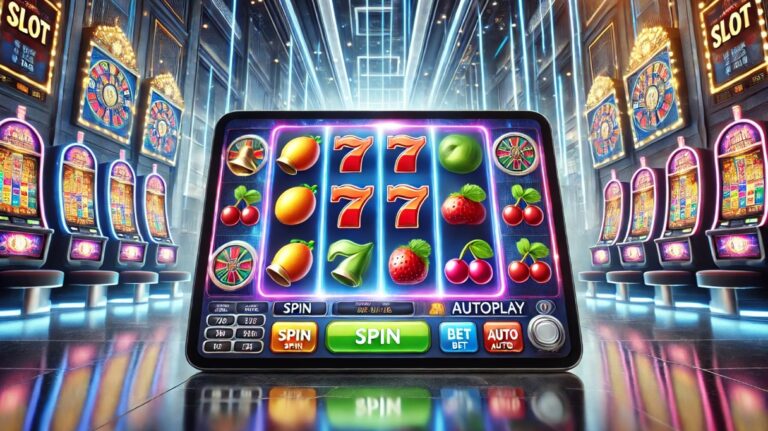The Whot card game is a strategic and fast-paced shedding game enjoyed by players of all ages. Originating in England in the 1930s, Whot has since evolved into multiple regional versions, with the Nigerian format becoming particularly popular.
Unlike standard card games, Whot uses a unique deck with distinct symbols and special rules. Whether you’re a beginner learning the basics or an experienced player refining your strategy, this comprehensive guide covers everything you need to master the Whot card game.
What Is The Whot Card Game And Where Did It Originate?
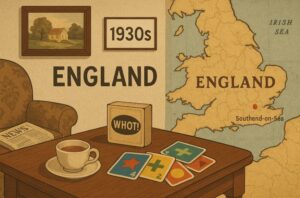
Whot is a shedding-type card game that uses a non-standard deck, offering a unique alternative to traditional playing cards. The game was invented in England by William Henry Storey in 1935.
Initially published by W. H. Storey & Co., it gained wider popularity when acquired by Waddingtons and became a staple family card game in Britain during the mid-20th century.
Over time, it transitioned into various formats, with the Nigerian version becoming one of the most played and culturally significant variants.
Whot uses a custom 54-card deck with symbols rather than suits. The cards are split into five suits: circles, squares, triangles, stars, and crosses.
Each suit is numbered, though not all numbers are represented in each set. The deck also includes five special “Whot” cards marked with the number 20, which are used to change the course of gameplay.
In Nigeria, Whot has become more than a pastime. It’s widely recognised as the country’s national card game. Its appeal lies in its simplicity, adaptability, and the blend of chance and strategy that gives players opportunities to outwit opponents through planning and observation.
How Do You Set Up The Whot Card Game?
Setting up a game of Whot is straightforward. The game can be played with two or more players. It works best with three to six players for balanced play.
Each player is dealt a number of cards depending on the chosen rule set:
- English rules: 6 cards per player
- Nigerian rules: 3 to 6 cards per player (agreed by players)
The remaining cards form a central draw pile, often referred to as the market. The top card from this pile is turned over to start the game as the initial call card. The rest of the pile remains face down and is used for drawing new cards during the game.
Players can play a card that matches either the number or the symbol of the call card. Alternatively, they can play a Whot card to change the symbol for the next turn. If they can’t play, they must draw a card from the market.
The first player to play all their cards wins the round. In extended games, scoring may be used to track players’ performance over multiple rounds.
What Are The Official Rules Of The Whot Card Game?
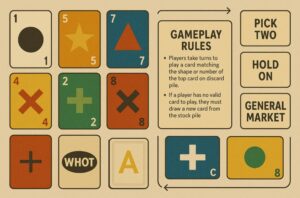
The rules can vary depending on whether players follow the English or Nigerian variation. However, the basic gameplay mechanics remain consistent. On their turn, each player must either:
- Match the symbol or number of the call card
- Play a Whot card and declare a new symbol
- Draw a card from the market if no match is possible
Players do not have to play a card even if they have a valid move, but they must draw from the market. The Whot card acts as a wild card, and the player who uses it can choose the suit that continues the game.
Nigerian-Specific Rules:
- The play direction is usually clockwise, but this can be changed by specific cards.
- Cards must be played within 10 seconds, or the player draws a penalty card.
- Specific declarations are required when playing certain cards. Failing to declare appropriately can result in penalties.
- Some cards cannot be defended against, such as 1, 8, and 14 cards.
Here is a table outlining the special cards and their functions in the Nigerian version:
| Card Number | Function | Action |
| 1 | Hold On | Skips all other players, player plays again |
| 2 | Pick Two | Next player picks 2 cards or defends with another 2 |
| 5 | Pick Three | Next player picks 3 cards or defends with another 5 |
| 8 | Skip | Next player loses their turn |
| 14 | General Market | All players pick one card, player plays again |
| 20 (Whot) | Wild Card | Change symbol, direction, or skip a player |
Players continue the game until one player finishes all their cards. If scoring is used, the remaining cards in players’ hands are added up, and cumulative scores may determine elimination or final rankings.
How Is A Typical Whot Gameplay Structured?
Gameplay begins with the first player placing a card on top of the call card that matches either the symbol or number. If no match exists, the player draws from the market. If the draw still doesn’t provide a playable card, the turn ends.
Key gameplay actions:
- Players may skip others using specific cards (e.g., 1 or 8)
- Whot cards allow strategic disruption by changing suits or direction
- Scoring may be done by counting the remaining cards in hand when a round ends
In a multi-round game, the player with the lowest total score after all rounds may be declared the overall winner. In “Knock-out Whot,” players whose card values exceed 100 are eliminated.
Here is a summary of card interactions during play:
| Action Type | Result |
| Matching Number | Player can place the card |
| Matching Symbol | Player can place the card |
| Playing Whot Card | Player chooses next symbol |
| No Play Available | Player draws from market |
| Special Card Played | Player follows the associated action |
In Nigerian rules, timing is informal but essential. Delayed actions can result in forced draws or missed turns, maintaining a steady game rhythm.
What Are The Strategies To Win The Whot Card Game?
Whot involves a considerable amount of strategy despite its reliance on chance. The following techniques help players increase their chances of winning:
- Hold on to defensive cards like 2s and 5s to counter opponents’ attacks
- Play high-value cards early to reduce scoring penalties
- Observe opponents to identify patterns and predict future plays
- Use Whot cards to change to suits that benefit your hand and limit others
- Delay playing Whot cards until strategically necessary
- If opponents have few cards, change suits or directions to disrupt their play
Other practical strategies include:
- Use “Double Decking” to change the shape advantageously by playing multiple cards of the same number in succession
- Reserve your 2 and 5 cards to block chain attacks
- Use Whot cards to force suit changes when you suspect opponents lack certain shapes
- Track cards that have already been played to anticipate risk
In Knock-out Whot, players are advised to shed star cards quickly since they carry penalties at the end of each round. If one or more star cards remain in a player’s hand, their score could double or even quadruple, depending on the number of stars left.
What Are The Different Variations Of The Whot Card Game?
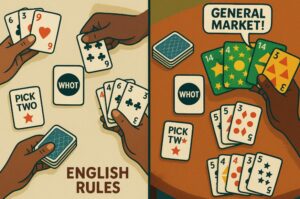
Over time, Whot has evolved into a game with multiple house rules and regional variants. These modifications often introduce new functions to existing cards, expand player actions, or adjust scoring methods. These variations make the game more engaging and customisable, depending on the group playing.
Common Gameplay Variations
Whot Card Extensions: In newer versions, playing a Whot card can allow the player not only to change the symbol but also to:
- o Reverse the direction of play
- o Force the next player to skip their turn
Straights: Players may be allowed to play multiple cards in sequence when they form a “straight”—a run of consecutive numbers. Some rule sets require that all cards in a straight share the same symbol, while others do not impose this restriction.
Star Card Modifications: In specific game versions, star cards can be:
- o Played using either the number outside the star or the doubled number inside it
- o Penalised during scoring by doubling the player’s total score for each star card left in hand
These flexible rules encourage players to adapt their tactics and offer fresh challenges in each session.
Special Card Assignments In Variants
Different regions or households may reassign functions to various numbered cards. Below is a comparison of two common variant sets:
Variant Set A
| Card Number | Name | Function |
| 1 | Hold On | All players lose a turn except the one who played; player goes again |
| 2 | Pick Two | Next player draws two cards and loses their turn |
| 3 | Suspension | Next player misses a turn |
| 14 | General Market | All other players draw one card and lose their turn |
Variant Set B
| Card Number | Name | Function |
| 1 | Hold On | Same as above |
| 4 | General Market | All other players draw one card and lose their turn |
| 7 | Pick Two | Same function as card 2 in other sets |
| 8 | Suspension | Next player loses their turn |
Additional Variant
Some versions also include:
| Card Number | Name | Function |
| 5 | Pick Three | Next player draws three cards and loses their turn |
These alterations not only increase the game’s replay value but also reflect how the game is embraced and localised by different cultures and communities.
How Does The Whot Card Game Compare With Other Classic Card Games?
Whot is often compared to Uno, Crazy Eights and Mau-Mau due to its similar mechanics of matching numbers or suits and using special cards. However, Whot differs due to its unique symbols, regional variants and cultural presence in specific communities.
Below is a comparative table highlighting the differences:
| Feature | Whot | Uno | Crazy Eights |
| Deck Type | Custom with 5 suits | Custom with colours and actions | Standard 52-card deck |
| Special Cards | 1, 2, 5, 8, 14, 20 | Skip, Draw Two, Wild | 8s as wild cards |
| Card Count | 54 cards | 108 cards | 52 cards |
| Cultural Significance | High in Nigeria and UK | Popular globally | Traditional card game |
| Strategic Complexity | High due to variable rules | Moderate | Moderate |
| Custom Rule Support | Common in Nigerian variant | Supported in house rules | Common in local play |
While Uno and Crazy Eights are widely recognised globally, Whot stands out for its verbal interaction, multiple regional formats and greater room for customisation.
Can You Play The Whot Card Game Online Or With Mobile Apps?
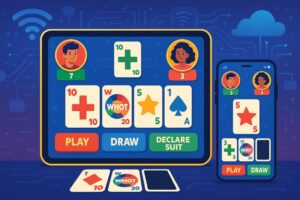
Whot has found its place in the digital gaming space, especially through mobile applications targeted at Nigerian and African audiences. Several versions allow users to play against the computer or real players online.
Popular digital Whot platforms include:
- Whot King
- Whot Africa
- Naija Whot
These platforms offer features such as:
- Real-time multiplayer gameplay
- In-app tutorials for new players
- Leaderboards and score tracking
- Options to choose game variants (e.g., Nigerian or English rules)
Digital versions retain the original mechanics while adding convenience and accessibility. They are an excellent way to practice the game and understand regional rule differences.
Why Is The Whot Card Game Culturally Significant In Nigeria And The UK?
In the UK, Whot’s cultural value stems from its historical presence. It was a go-to family game during the mid-20th century, often found in school classrooms and holiday homes.
In Nigeria, Whot has evolved into a cultural staple. It is widely played at social gatherings, from weddings to university hostels and street corners. Its appeal cuts across generations and social classes, making it a unifying game.
The Nigerian variant is particularly animated, with rules that encourage player interaction and verbal engagement. Phrases like “Hold on”, “Pick two” and “Last card” become a central part of the experience. These spoken rules add a layer of drama and entertainment, enhancing the game’s social value.
Its cultural integration is also reflected in digital media, television game shows and even educational settings, where Whot is used to teach logic, counting and decision-making.
What Are The Meanings Of Whot Special Cards?
Special cards in Whot can completely alter the direction of the game. Understanding their meanings is key to strategic gameplay.
Here’s a breakdown of their typical functions in different variants:
- 1 (Hold On): Skips all other players. The player plays again.
- 2 (Pick Two): Next player must draw two cards unless they also play a 2.
- 5 (Pick Three): Next player draws three cards or counters with another 5.
- 8 (Skip): Skips the next player’s turn.
- 14 (General Market): All opponents draw one card each; the player plays again.
- 20 (Whot): Wild card that changes the symbol in play and may reverse direction or skip a turn.
Whot cards can also be used strategically to delay or block players with fewer cards. Timing the use of these cards is often the difference between winning and losing.
How Can Beginners Learn The Whot Card Game Easily?
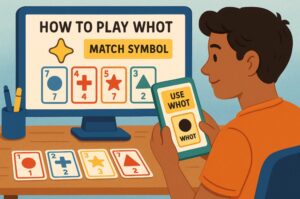
For new players, starting with a simple version of Whot is ideal. Here are easy steps to help beginners get comfortable with the game:
- Begin with 2 to 3 players to learn the basics
- Stick to English rules initially before exploring regional variants
- Familiarise yourself with the symbols and special cards
- Watch online video tutorials or use mobile apps with guided play
- Play a few rounds without scoring to get used to the pace
Once familiar with the core mechanics, players can explore variations such as “Double Decking,” “Straights,” and “Knock-out Whot.” These enhance gameplay and introduce deeper strategic elements.
Conclusion
The Whot card game stands out as a timeless classic with both simplicity and strategic depth. Whether you’re learning it for the first time or revisiting it as a nostalgic favourite, Whot offers endless entertainment with cultural flavour.
From its British roots to its Nigerian popularity, it’s a game that connects players across backgrounds and borders. Dive in, learn the rules, and enjoy the thrilling ride that only Whot can offer.
FAQs About Whot Card Game
What makes Whot different from Uno or Crazy Eights?
Whot uses a custom set of suits and has a strong regional identity, especially in Nigeria. Its gameplay is more verbal and flexible.
How many players can participate in a Whot game?
A minimum of 2 players is required, but the game works best with 3 to 6 players for maximum engagement.
Is the Whot card game suitable for children?
Yes, the game is family-friendly. It’s great for teaching children pattern recognition and turn-based strategy.
Can I create house rules for Whot?
Absolutely. One of Whot’s strengths is its adaptability. Players often add new rules or modify existing ones.
What happens if the draw pile runs out of cards?
Shuffle all previously played cards (except the call card) to form a new draw pile.
Are star cards good or bad in Whot?
They’re both. While they can be played normally, they double the score against you if left in hand, especially in “Knock-out Whot”.
Is Whot available in physical stores in the UK?
Yes, it’s available through retailers like Winning Moves and online marketplaces like Amazon.

